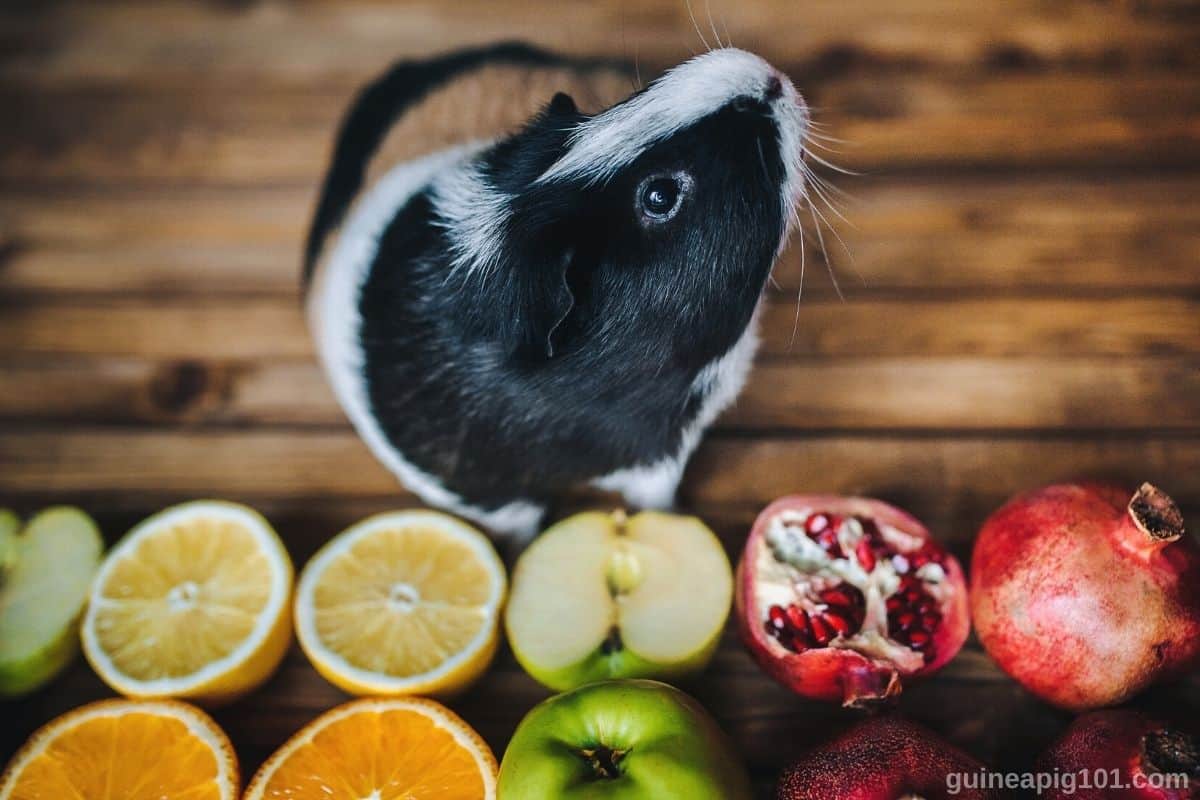Pomegranate is loaded with tons of essential nutrients. It makes for a perfect snack for us. One day while I was sitting around my guinea pigs and having some pomegranates, my piggies started wheeking like crazy. I gave them a small piece, and they went crazy. But I then thought, should I feed them some more? Can guinea pigs eat pomegranate? Is pomegranate safe for my guinea pigs? I did some research, and here is what I found out.
Guinea pigs can eat pomegranate but only in a small quantity. Pomegranate is rich in essential nutrients, including vitamin c and folate, which is vital for our guinea pigs. However, the seeds of the pomegranate can possess choking hazards for young guinea pigs. Thus, be cautious while feeding the same.
You should lookout for a good quality pomegranate that has smaller seeds for your guinea pigs.
Make sure you only feed it to matured guinea pigs and not young ones as the seeds might get choked in their food pipe. Also, remember that fruits like pomegranate are more of a treat for guinea pigs.
Thus, it should be served sparsely. The significant portion of your guinea pig must be hay, followed by a cup of vegetables daily.
With that out of the way, let us look at what nutrients do guinea pigs possess and what are the benefits and hazards you should know.
Nutrition in pomegranate?
Source: USDA National Nutrient database
| Nutrients | Amount |
|---|---|
| Vitamin C | 10.2 mg/ 100 g |
| Vitamin K | 16.4 µg/100 g |
| Folate | 38 µg/ 100 g |
| Calcium | 10 mg/ 100 g |
| Phosphorous | 36 mg/ 100 g |
| Potassium | 236 mg/ 100 g |
| Fiber | 4 g/ 100 g |
| Sugar | 13.67 g/ 100 g |
| Protein | 1.67 g/ 100 g |
| Carbs | 18.7 g/ 100 g |
| Calories | 83 Kcal |
| Fat | 1.17 g/ 100 g |
| Water | 77.93 g/ 100 g |
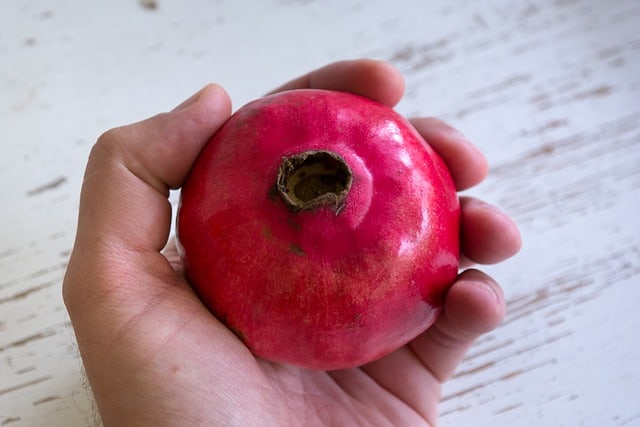
Pomegranate contains a lot of nutrients in it. Let us have a look at some of the most crucial vitamins it possesses:
Vitamin C: Pomegranate is rich in Vitamin C, which is one of the essential vitamins needed by the body. It is required for a lot of functions of the body, including the formation of blood vessels, strengthening the immune system & quick recovery of wounds and diseases.
Vitamin K: Vitamin K is another essential vitamin needed by our guinea pigs. Pomegranate contains a lot of Vitamin K that is required by the body for the clotting of blood and quick recovery of wounds.
Folate: Pomegranate is also rich in folate. It is basically a B-Vitamin needed by the body for various functions. The primary purpose of this vitamin includes the formation of Red blood cells, converting carbohydrates into energy & more.
Fiber: Pomegranate is also a rich source of fiber for the body. Fiber is essential for maintaining good bowel movement, lower cholesterol levels maintaining an excellent digestive system.
Is pomegranate bad for guinea pigs?
Pomegranate is an excellent snack for our guinea pigs when fed in moderation.
However, excessive feeding can have some terrible effects on your guinea pig’s health.
Anything in excess is bad for health
As it is said that anything in excess is bad, the same goes for pomegranate as well. If we serve it sparsely to our guinea pigs, then there is not much harm; however, excessive feeding can have some side effects. Some of the most common side effects include:
Obesity: Pomegranate is rich in natural sugar that is terrible for our guinea pig’s health. It contains around 14grams of sugar for every 100 grams of seeds. Serving a few pieces once in a while shall be excellent for our guinea pigs, however, helping it regularly might result in obesity. Some older guinea pigs also suffer from diabetes when they are fed with a diet rich in sugar for a prolonged period.
Mouth sore: Pomegranate is acidic in nature. It contains some natural acid in it that can lead to mouth sores in guinea pigs. Although a small feeding might not have a severe impact, excess feeding or regular feeding might lead to a mouth sore in your piggies.
Diarrhea: Guinea pigs have a sensitive digestive system. They cannot digest new food or rare treat like exotic fruits well. So, make sure you introduce it slowly and in small quantities to avoid the risk of Diarrhea in your guinea pigs. Although pomegranate contains a lot of fiber that aids in digestion, still, overfeeding can result in a digestive imbalance in your guinea pigs.
Choking hazards: Pomegranate does contain small hard seeds that can be a choking hazard for some young guinea pigs. Although a little feeding once in a while to matured piggies shall be fine, do make sure you avoid feeding it to young guinea pigs.
Is pomegranate good for guinea pigs?
Pomegranate is considered one of the healthiest fruits on earth. It contains a lot of vitamins and minerals needed by our body.
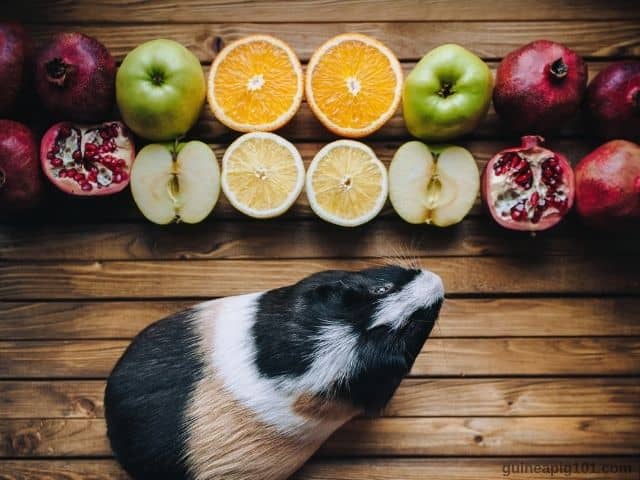
It also includes a ton of antioxidants that helps prevents diseases and promote healthy growth of the body.
Prevention of scurvy: Rich in vitamin c, pomegranate can help prevent scurvy in guinea pigs. Many guinea pigs are diagnosed with scurvy due to a lack of Vitamin C in their diet. You must make sure you add some food rich in vitamin c in your guinea pig’s diet.
Prevents inflammation: Pomegranate is rich in a compound called punicalagin that can help reduce inflammation in guinea pigs. It also helps prevents lots of diseases in guinea pigs.
Fights against diseases: Pomegranate is rich in Vitamin C, antioxidants, and lots of other nutrients that help fight various diseases in guinea pigs. Studies claim that compounds present in pomegranate can even battle against life-threatening diseases, including cancer.
Promotes healthy growth: Pomegranate also contains other nutrients, including Calcium, phosphorous, potassium, iron, magnesium, and folate. These minerals help in the proper functioning of the body and promote healthy growth. Adding fruits like the pomegranate in a small amount can be beneficial for their health.
So, now that we know that guinea pigs can eat a pomegranate, and it is beneficial for their health. Let us learn more about its serving size and frequency.
How much pomegranate can guinea pigs eat?
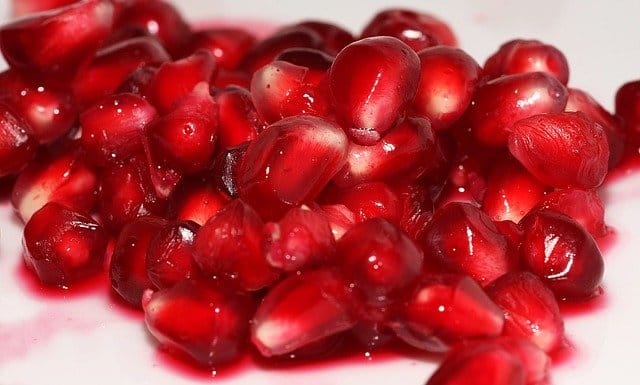
Guinea pigs can eat only a few pieces of pomegranate daily. It is recommended to serve only 2-3 pieces of pomegranate at a time.
You should never go beyond that as it contains a lot of sugar in it. We should only serve pomegranate as a treat and never make it a part of your guinea pig’s diet.
Also, make sure you never serve pomegranate to young guinea pigs as the seeds possess a choking hazard for your guinea pigs.
How often can guinea pigs eat pomegranate?
Guinea pigs can eat pomegranate only once a week. Pomegranate is not the best food for your guinea pigs; thus, it must be fed sparsely.
Guinea pigs can get excited and wheek and squeak for more when you serve pomegranate to your guinea pigs. But you must never help more than a few pieces at a time.
You can serve a cup of fresh veggies along with treats like pomegranate. That shall ensure your guinea pigs get busy with the vegetables when they are done with the treat.
Can guinea pigs eat pomegranate seeds?
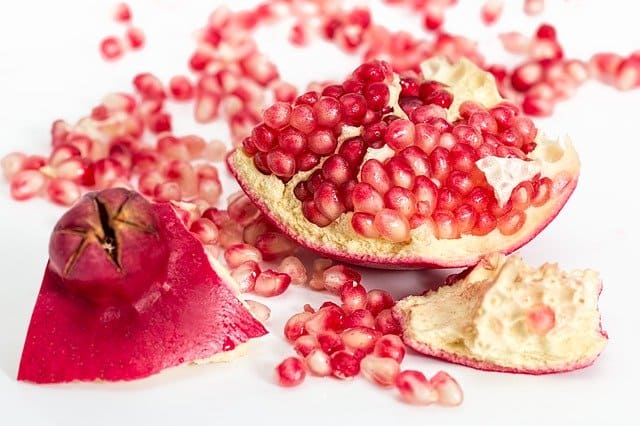
Yes, guinea pigs can eat pomegranate seed but only in moderation. Make sure you serve only small-sized seeds to your guinea pigs to avoid any choking hazards.
Also, avoid serving pomegranate seed to a young guinea pig as it can get stuck in their food pipe, resulting in choking.
Although the seeds are rich in fiber and protein, we must only serve it in moderation to avoid health issues and potential hazards like choking.
Can guinea pigs eat pomegranate skin?
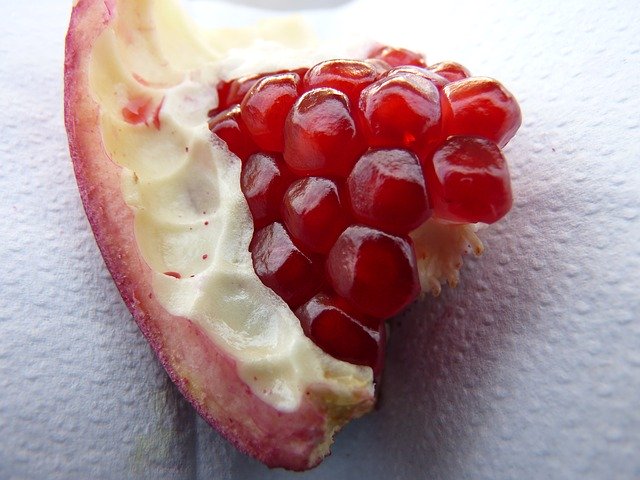
No, guinea pigs cannot eat the skin of pomegranate. The seed has a rough texture and doesn’t possess any nutritional value.
Thus, make sure you remove the skin before serving it to your guinea pigs.
The skin can also have some wax & chemical traces attached to it that can be terrible for our guinea pigs.
Can guinea pigs drink pomegranate juice?
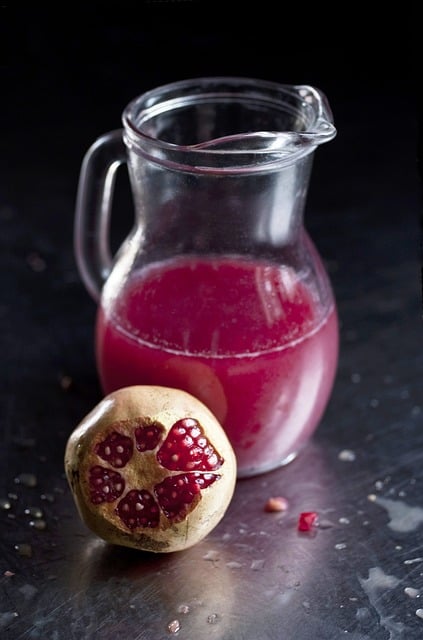
No, guinea pigs cannot drink pomegranate juice at all. The juice of pomegranate may contain some added ingredients that can be terrible for their digestive system.
Also, pomegranate juices are high in sugar that is not good for our guinea pig’s health.
Thus, avoid serving pomegranate juice to your guinea pigs. Only serve a few pieces of small pomegranate to prevent health issues.
Can guinea pigs eat frozen pomegranate?
No, guinea pigs cannot eat a frozen pomegranate. Frozen food(cold) can lead to diarrhea as it sets off the digestive system of our guinea pigs.
Always make sure you thaw the pomegranate before serving it to your guinea pigs.
It is best to serve only fresh pomegranate in moderation to our guinea pigs.
How to prepare pomegranate for your guinea pigs?
Preparing pomegranate is quite simple and easy. Here are a few steps you must follow to prepare pomegranate for our guinea pigs:
- Choose a fresh and ripe pomegranate. The flesh should be shiny red. If the flesh is white, that means it’s not ripe, and thus you cannot serve such pomegranate to your guinea pigs.
- The second step is to take a few small pomegranate pieces (2-3) and serve it to your guinea pigs.
- Make sure you serve it with other veggies and never make it a part of their daily diet
- Lastly, you need to remove any uneaten fruits or vegetables from the cage to avoid fly and rat infestation in the cage.
Conclusion: Guinea pigs and Pomegranate
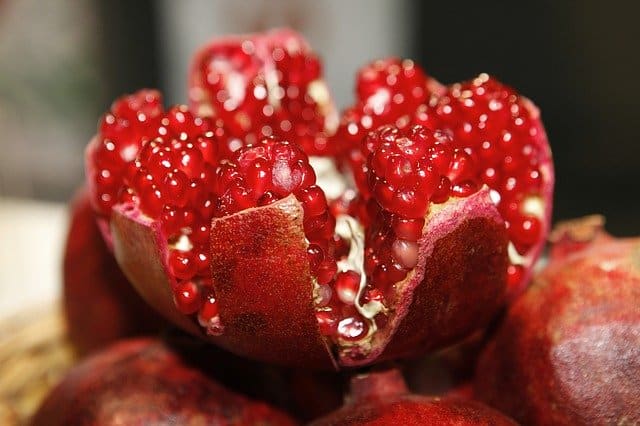
- Pomegranate is rich in Vitamin C, Vitamin K, Folate, Fiber, and other essential nutrients.
- Can guinea pigs eat pomegranate? Yes, guinea pigs can eat pomegranate but only in moderation. Excessive feeding can be terrible for your guinea pig’s health.
- You should only feed 2-3 pieces of pomegranate flesh to your guinea pigs.
- Limit the feeding to once a week. Never feed pomegranate more than once a week.
- Make sure you remove the skin and only serve the flesh to your guinea pigs.
- Overfeeding pomegranate can lead to obesity, mouth sore & diarrhea in guinea pigs.
- Always remember the staple part of the guinea pig’s diet is hay and a small portion of fresh veggies. Fruits are only supplements or snacks that you should be serving once in a while.
Source: Ultimate Guide to Pomegranates, Pomegranate seeds, Potent health effects of pomegranate, Nutritional and Chemical Evaluation for Pomegranate, Diet Composition and Mineral Balance in Guinea Pigs, Dietary Vitamin C, and Vitamin E on Guinea Pig Immune Responses to Mitogens, Vitamin C requirements of the guinea-pig, Is Your Guinea Pig’s Diet Providing the Right Nutrients? Care of Guinea Pigs.
